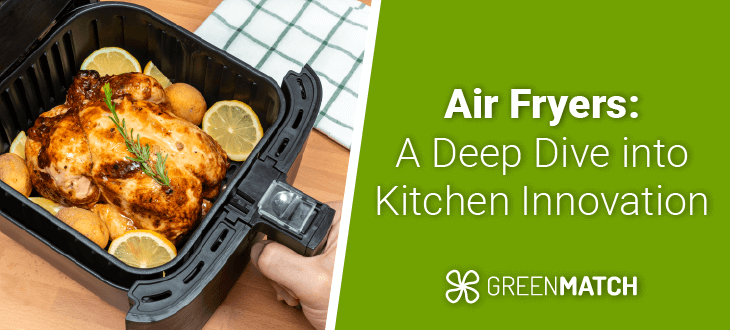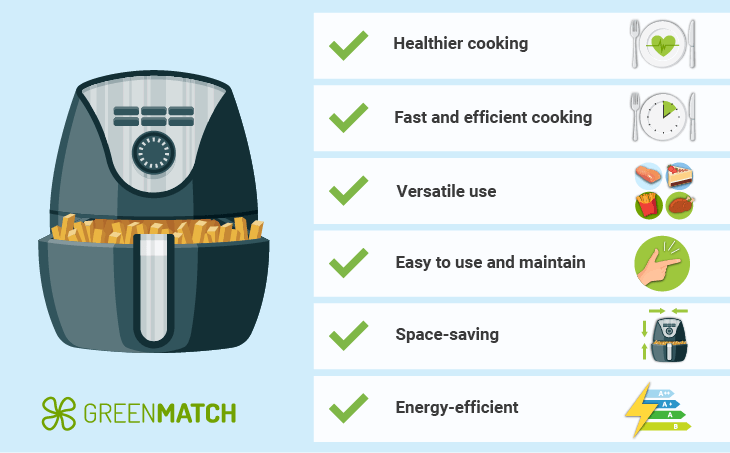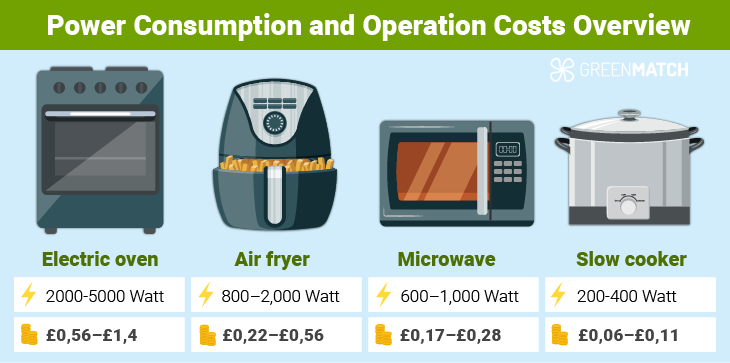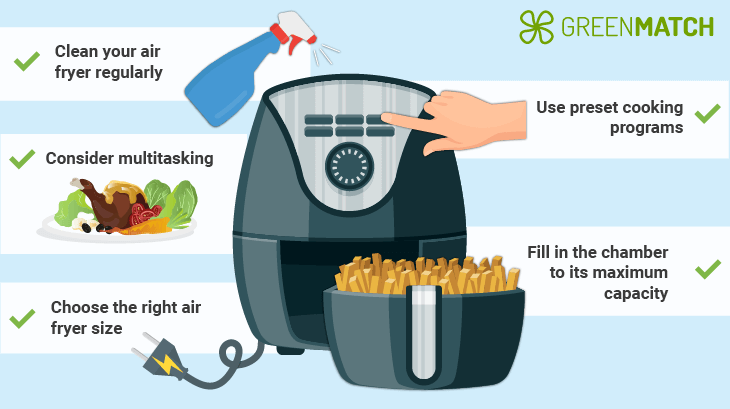- GreenMatch
- Air Fryers
How Energy-Efficient Are Air Fryers? A Comprehensive Analysis


Air fryers have become increasingly popular due to their efficiency in cooking food quickly and with less oil.
The number of kitchen appliances emerging in our cooking spaces is rising. There's hardly a dish we can't trust in the hands of some specific gadget—an egg boiler, breadmaker, slow cooker, milk frother, you name it. The good old hob or a whisk sounds like some culinary enthusiast's choice.
However, cooking meals from scratch is no longer considered the healthiest and cheapest way to prepare food. With energy bills, grocery prices, and environmental concerns rising, one might wonder which method is best for getting dinner on one's plate.
Air fryers are a popular choice among all innovative appliances as they deliver crispy fried food without oil dripping. But how efficient are they, and what makes them a valuable addition to your kitchen?
In this article, we'll examine the air fryer's energy efficiency, which will help you decide whether you need it on your kitchen counter.
Key features and benefits of air fryers

Air fryers are usually designed to be small and aesthetically pleasing to fit various kitchen designs and sizes. With the growing demand for healthy food, the air fryer market is projected to grow by 7% in 2024–2032.
- Quotes from local engineers
- Payment by finance available
- Save up to £975*
It only takes 30 seconds



Therefore, if you decide to get an air fryer, what is there for you apart from those crunchy, mouthwatering nuggets?
- Healthier cooking: Air fryers reduce up to 70% of the total calories and fats by using hot air to cook food, requiring minimal to no oil.
- Fast and efficient cooking: Air fryers save time and energy. They heat up quickly due to high-speed convection and minimise cooking time.
- Versatile use: Air fryers can be used for grilling, baking, roasting, dehydrating or reheating and not just reproducing the deep-frying experience.
- Easy to use and maintain: Most models have pre-set cooking programs for various meals. Moreover, air fryers are made of nonstick material, making them easy to clean.
- Space-saving: If you're not big on cooking or limited in space, you can go oven-less and replace it safely with another countertop, like an air fryer.
- Energy-efficient: Cooking food faster and in a smaller cooking chamber (compared to ovens) translated to a more focused heat source, reducing energy consumption.
From an efficiency perspective, air fryers are a revolutionary kitchen appliance. They offer a compelling blend of rapid cooking times, reduced energy consumption, and cost-effectiveness.
Energy consumption of air fryers
The kitchen has the most energy-consuming appliances. Yet air fryers aren't on that list and typically consume significantly less energy than traditional ovens.
Air fryers typically use between 1,000 to 1,800 watts of power, with an average model consuming around 1,500 watts. This is comparable to small kitchen appliances like coffee makers and toaster ovens. The average air fryer operates at around 1.4–1.7 kW/h (kilowatts per hour) of electricity per hour.
If used daily for an hour, this translates to approximately £0.30-£0.50 added to your monthly electric bill. In comparison, conventional ovens consume between 2 and 5 kWh.
Such a difference happens for the following reasons:
- Convection heating – which circulates hot air around the food, which results in faster cooking times.
- Full-load cooking – thanks to which the air fryer can operate most efficiently.
- Preheat efficiency—This option is crucial for energy savings. Preheat only when necessary, for example, when cooking bulky items that require more time to reach optimal cooking temperatures.
- Wattage considerations – Air fryers with higher wattages cook food faster, which reduces energy consumption. Yet it's important to be smart about the size of your air fryer and not go for high-wattage fryers if your household size doesn't need it.
- Smaller cooking chambers – smaller than ovens, air fryers distribute heat more efficiently, leading to quicker and more uniform cooking.
Air fryers usually use 800–2,000 watts of power depending on the manufacturer, model, and size. The wattage on the packaging represents the maximum electricity the air fryer can consume, but that doesn't mean it will (and usually doesn't) consume the rated wattage each time.
But in reality, more factors impact electricity usage: the cooking temperatures, how often you use the air fryer or how much food you cook.
When you set the temperature higher, the fryer's operating temperature also jumps. Logically, the higher the temperature, the higher the energy usage.
However, what also factors in is how long you cook your food, even at the same temperature. Naturally, cooking the whole chicken takes more time than cooking a single chicken breast; consequently, more electricity is consumed.
Air fryer energy efficiency overview
With all the above-mentioned air fryer theory, let's see how it performs compared to other common cooking gadgets. Knowing that an air fryer is more energy efficient is good, but seeing how it influences the eating experience and cooking costs won't hurt either.

So, are air fryers energy-efficient?
Energy efficiency is about achieving the same result using less energy. However, the results might vary since multiple appliances have different operational mechanisms and purposes.
Compared to ovens, air fryers are cheaper and cost-effective but have a lower capacity. They're more expensive to run than microwaves, pressure and slow cookers but deliver different results due to different cooking methods.
On average, an air fryer costs between £30 and £ 250 to run, and it costs £0,22–£0,56 to run a slow cooker.
| Cost | Capacity (W) | Price range | Cost to cook (per 60 minutes)* |
|---|---|---|---|
| Electric oven | 2,000–5,000 | £200–£5,000 | £0.45–£1.12 |
| Pressure cooker | 700–1,200 | £50–£200 | £0.16–£0.27 |
| Air fryer | 800–2,000 | £30–£250 | £0.18–£0.45 |
| Slow cooker | 200–400 | £20–£100 | £0.04–£0.09 |
| Microwave | 600–1,000 | £50–£200 | £0.13–£0.22 |
Yet, the energy efficiency of cooking appliances doesn't revolve around cost-effectiveness; it also revolves around the desired cooking result. If you think about it, your personal food preferences play an important role in the energy efficiency of cooking appliances.
While ovens and air fryers can roast meals, pressure cookers, slow cookers, or microwaves prepare the meal by heating it from the inside, which influences the overall taste and look of the meal.
While one homeowner wants their chicken crispy and browned, another enjoys it simply cooked until ready. Therefore, the latter might find their air fryer inefficient: technically, more energy was used to provide an unsatisfactory result.
So, when selecting an air fryer, it's crucial to consider energy efficiency, the desired cooking result, and personal preferences. This will help you make informed decisions that align with your culinary needs, environmental consciousness, and wallet.
What is the economic advantage of an air fryer?
Air fryers offer advantages, particularly regarding energy efficiency and cost savings. For instance, a typical 4-quart air fryer uses 1,500 watts, almost half the power consumption of a regular full-size oven.
An air fryer requires half the electricity, making it 50% more efficient than a full-size electric oven.
When it comes to costs using a 1500W air fryer for 30 minutes once a day amounts to, around 12.6p per day £0.88 per week or £3.78 per month. These expenses are significantly lower than running a full-size oven, for the duration.
Comparing Air Fryers to Other Cooking Methods
Air Fryers vs. Ovens
Air fryers are generally more energy-efficient than traditional ovens, especially for cooking small quantities of food. For example, cooking chicken in an air fryer can use less than half the energy an oven requires.
This is because air fryers have a smaller cooking compartment and a more powerful fan, which allows them to cook food faster and more efficiently. A typical air fryer uses 1,200 and 1,500 watts, while a conventional oven can use up to 5,000 watts. In practical terms, cooking a chicken in an air fryer might cost around 12p, compared to 26p in an oven. Using the air fryer frequently for small meals can result in significant yearly savings.
| Appliance | Power Consumption (Watts) | Cost per Hour (pence) | Cooking Time for Chicken (minutes) | Cost per Cooking Session (pence) |
|---|---|---|---|---|
| Air Fryer | 1,500 | 12.6 | 25 | 12.6 |
| Oven | 3,000 | 25.2 | 40 | 26 |
This means that, over time, an air fryer can save a significant amount on energy bills. Some studies show air fryers are generally more energy-efficient due to shorter cooking times.
Air Fryers vs. Microwaves
While microwaves are also energy-efficient, they cannot achieve the same crispy texture as air fryers. This makes air fryers a better choice for cooking items like fries, chicken wings, and other foods that benefit from a crispy exterior.
Technological Advancements
Recent advancements in air fryer technology have made these appliances even more efficient and user-friendly. Modern air fryers have smart features like app connectivity, precise temperature controls, and enhanced safety mechanisms.
These improvements not only make cooking more convenient but also further reduce energy consumption.
Health Benefits of Air Fryers
Air fryers are marketed as a healthier alternative to deep frying because they require significantly less oil. This results in lower fat content in cooked food, which can help with weight management and reduce the risk of heart disease and other health issues associated with high-fat diets. Additionally, air frying reduces the formation of harmful compounds like acrylamide, which is linked to certain cancers.
This means it can lower the amount of acrylamide in fried potatoes by up to 90% compared to deep frying. Additionally, it can cut calories by 70% to 80% and has much less fat than traditional frying methods.
However, it is important to note that while air-fried foods are healthier than deep-fried ones, they are still considered fried and should be consumed in moderation. Some studies have shown that air frying fatty fish can decrease healthy fats and slightly increase cholesterol oxidation products, which may negatively affect cholesterol levels.
Cost Savings with Air Fryers
Cost Savings
Using an air fryer can lead to significant long-term savings. For instance, cooking with an air fryer for 150 hours a year costs approximately £29.40, compared to £91.20 for an electric oven and £116.40 for a gas oven. These savings can increase over time, making air fryers a cost-effective choice for many households.
Detailed Cost Analysis
A study by Instant Pot found that cooking with an air fryer can save up to 84% of energy compared to an electric oven. This shows that cooking with an air fryer can significantly save energy compared to an electric oven.
For instance, using a 1,500W air fryer for 30 minutes daily costs around £3.78 per month, compared to higher costs for running a full-size oven. This makes air fryers a cost-effective option for small meals. However, for larger meals or longer cooking times, ovens may still be more cost-effective due to their better insulation and ability to cook multiple dishes simultaneously.
Let's break down the energy costs based on current electricity prices as of June 2024. We'll use the average unit price rate of 22.36p per kWh for our calculations to provide a conservative estimate.
| Appliance | Power Consumption (Watts) | Daily Usage (Minutes) | Daily Cost (pence) | Weekly Cost (£) | Monthly Cost (£) | Annual Cost (£) |
|---|---|---|---|---|---|---|
| Air Fryer | 1500 | 30 | 16.80 | 1.17 | 5.03 | 60.36 |
| Conventional Oven | 3000 | 30 | 33.50 | 2.35 | 10.06 | 120.72 |
Practical Tips for Cost Savings
To get the most out of your air fryer, consider the following tips:
- Preheating: Preheat the air fryer for a few minutes before cooking to ensure even cooking and reduce overall cooking time. Unlike conventional ovens, they often take 10-15 minutes to reach the desired temperature.
- Batch Cooking: Cook multiple items at once to maximise the use of the air fryer's capacity.
- Avoid Overcrowding: Do not overcrowd the basket, as this can impede air circulation and lead to uneven cooking.
- Versatility: Air fryers can cook a wide variety of foods quickly, from proteins to vegetables and even baked goods
- Use Cooking Spray Sparingly: While air fryers require less oil, a light spray can help achieve a crispier finish without adding significant calories.
- Regular Maintenance: Clean the air fryer regularly to maintain efficiency and prolong lifespan.
Cooking Times
Air fryers consistently cook food faster than conventional ovens. This time-saving aspect is one of the key factors contributing to their energy efficiency and popularity.
Here's a detailed comparison of cooking times for various popular foods:
| Food Item | Temperature (°F) | Air Fryer Time (minutes) | Oven Time (minutes) |
|---|---|---|---|
| Chicken Thighs | 400 | 20-25 | 40 |
| Chicken Wings | 375 | 10-12 | 40 |
| Brussels Sprouts | 350 | 15-18 | 40 |
| French Fries (from scratch) | 400 | 10-20 | 40-45 |
| Bacon | 400 | 5-10 | 15-20 |
| Salmon Fillet | 400 | 5-7 | 12-15 |
| Pork Chops | 375 | 12-15 | 25-30 |
| Meatballs | 400 | 7-10 | 20-25 |
| Roasted Vegetables | 375 | 10-15 | 20-30 |
| Frozen Pizza | 400 | 6-8 | 15-20 |
It's important to note that cooking times can vary depending on the size and model of your air fryer and the quantity and thickness of the food being cooked. However, a general rule of thumb is that air fryers typically reduce cooking time by about 20-25% compared to conventional ovens.
What's the most energy-efficient air fryer?
Most modern air fryers come with a standard set of programs: air fry, roast, bake, reheat, grill, steam, and dehydrate. The program selection depends on the model and brand.
So, when choosing an energy-efficient air fryer, consider the size of your household, menu preferences, and available countertop space.
Generally, homeowners love their air fryers to be compact, easy to use and maintain, multifunctional, dishwasher-safe, and most of all – affordable.
Here's the overview of the most popular air fryer models in the UK
| Brand | Price | Dimensions (DxWxH; cm) | Wattage (W) | Food capacity (litres) | Dishwasher safe | Programmes | Warranty |
|---|---|---|---|---|---|---|---|
| Tower T17023 Air Fryer | £55 | 25.6 x 32.4 x 25.3 | 1000 | 2.2 | No | Temperature control, programmable | 3 years |
| Ninja AF100UK | £150 | 27.9 x 33 x 33 | 1550 | 3.8 | Yes (frying basket and crisper plate) | Standard | 2 years |
| Tefal ActiFry | £124 | 30.3 x 43.3 x 23.8 | 1400 | 2 | Yes (only the insides) | 9 menu auto-programs, automatic stirring paddle | 2 years |
| Salter EK4548 | £99 | 39 x 38.5 x 33 | 1600 | 8.2 | No | Standard | 1 year |
| InstantVortex Plus ClearCook | £129 | 37x 30 x 33 | 1700 | 5.7 | Yes (dishwasher-safe parts) | Standard+ Dippy Eggs, Veggie Fajitas, Yorkshire Pudding wraps | 1 year |
While searching for a dream air fryer, first decide which operations you'd want it to perform, how often, and for how many people.
To keep your fryer's efficiency at max, there are well-tried tips you could follow.
Practical tips for maximising energy savings

- Fill in the chamber to its maximum capacity: You effectively trap the hot air, ensuring that each piece of food receives enough heat to be cooked properly.
- Use preset cooking programs: Opt for an air fryer with various cooking programs. This will free up your hands and time and optimise the cooking time and temperatures for specific dishes without requiring manual adjustments.
- Clean your air fryer regularly: A clogged air filter can make it difficult for the hot air to circulate, resulting in longer cooking time or undercooked food and increased energy consumption.
- Consider multitasking: Try cooking multiple items at once to optimise energy consumption.
- Choose the right air fryer size: The bigger the air fryer, the more energy it needs to achieve the same effect. If your household has two people, choose a lower-wattage fryer to reduce your appliance's energy consumption.
User Experiences
Many users report that air fryers are efficient, versatile, and easy to use. Common praises include the ability to cook a variety of foods quickly and with minimal oil, resulting in healthier meals. However, some users note that air fryers are best suited for smaller quantities of food and may not replace traditional ovens for larger meals.
Common praises include:
- Quick cooking times: Many users appreciate how air fryers can significantly reduce cooking times compared to traditional ovens.
- Healthier meals: The ability to cook with minimal oil is frequently cited as a major benefit, leading to healthier meal options.
- Convenience: Users find air fryers convenient for cooking various foods, especially quick meals or snacks.
- Crispy results: Many report achieving crispy exteriors on foods like fries and chicken wings, similar to deep-frying but with less oil.
- Easy cleaning: Several users mention that air fryers are relatively easy to clean, especially models with dishwasher-safe parts.
Limitations
While air fryers are highly efficient for small meals, they have limitations. Their smaller capacity may not be suitable for cooking large meals or for households with many members. Additionally, certain foods may not achieve the same texture or flavour as when cooked in a conventional oven.
- Capacity constraints: Air fryers are often best suited for smaller quantities of food, which may not be ideal for larger families or gatherings.
- Learning curve: Some users need time to experiment with cooking times and temperatures to achieve optimal results.
- Counter space: The appliance's size can be a concern for those with limited kitchen space.
- Noise levels: Some models can be noisy during operation, which might be a consideration for some users
However, air fryers can be a cost-effective and healthier alternative to traditional frying methods. They use less electricity than ovens for small meals and reduce the fat content in foods. Additionally, they lower the risk of harmful compound formation. However, you should use them for small quantities and not completely replace other cooking methods in a balanced diet.
Air fryers are more expensive but energy-efficient than traditional ovens. Any homeowner would appreciate saving some money on cooking.
While there are even cheaper cooking options, is it worth it if your precious dinner tastes like cardboard? You decide. Happy air frying!
FAQ
Yes, air fryers require little to no oil for cooking and by preparing food using hot air the amount of calories can be cut down by 70–80%.
Yes, air fryers are generally considered more energy-efficient than traditional ovens. Carefully consider your household size and follow other tips to keep your air fryer’s efficiency at max.
The idea of the best air fryer differs from homeowner to homeowner. Yet, Instant, Tower, and Ninja are considered to be some of the most popular air fryer brands among UK homeowners.
No, air fryers don’t consume much electricity. In fact, they are quite cost-saving compared to traditional ovens.


We strive to connect our customers with the right product and supplier. Would you like to be part of GreenMatch?

